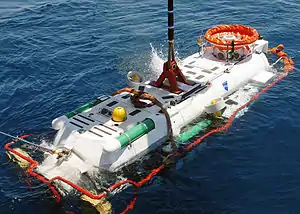LR5
The LR5 is a manned submersible which was used by the British Royal Navy until 2009 when it was leased to support the Royal Australian Navy. It is designed for retrieving sailors from stranded submarines and is capable of rescuing 16 at a time. The Royal Navy now has the use of the NATO Submarine Rescue System.
 LR5 rescue vehicle is lowered into the water by a crane from the Fennica | |
| History | |
|---|---|
| Name: | LR5 |
| Builder: | James Fisher Defence[1] |
| Acquired: | June 2009[2] |
| Status: | in active service, as of 2018 |
| General characteristics [3] | |
| Class and type: | DSAR class submarine rescue vehicle[1] |
| Tonnage: | 24 t (24 long tons; 26 short tons) (in air weight) |
| Length: | 9.6 m (31 ft) |
| Beam: | 3.2 m (10 ft) |
| Depth: | 2.7 m (8 ft 10 in) |
| Propulsion: | 2 × 10 kW (13 hp) electric motors |
| Speed: | 3 knots (5.6 km/h; 3.5 mph) |
| Endurance: | 10 hours |
| Test depth: | 650 m (2,130 ft) |
| Capacity: | 1,200 kg (16 persons) |
| Crew: | 2 |
Use
The LR5 was used briefly in the unsuccessful rescue of the crew of the Russian Kursk. It did not get to Kursk in time and all 118 hands died.
See also
- Scorpio ROV – A work class remotely operated underwater vehicle
- Deep-submergence rescue vehicle – Submersible used for rescue of downed submarines and clandestine missions
References
- "DSAR Class Submarine Rescue Vehicles : Overview". James Fisher Defence. 2012. Retrieved 7 July 2012.
- "Remora replacement arrives". Australian Defence Magazine. 12 June 2009. Retrieved 7 July 2012.
- "DSAR Class Submarine Rescue Vehicles : Tech Spec". James Fisher Defence. 2012. Retrieved 7 July 2012.
External links
![]() Media related to LR5 (submarine, 1978) at Wikimedia Commons
Media related to LR5 (submarine, 1978) at Wikimedia Commons
| Attack class |
|
|---|---|
| Collins class | |
| Oberon class | |
| Odin class | |
| J class | |
| E class | |
| Other submarines | |
| Bases and tenders | |
This article is issued from Wikipedia. The text is licensed under Creative Commons - Attribution - Sharealike. Additional terms may apply for the media files.